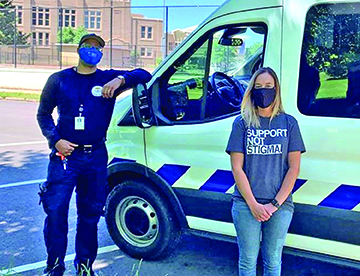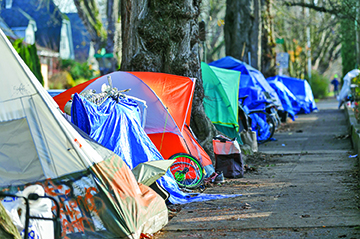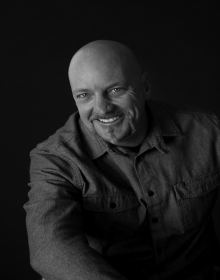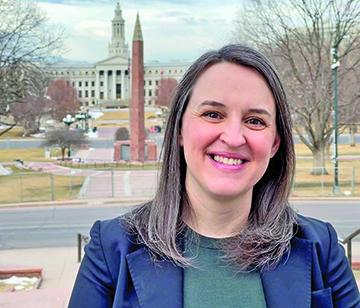“What can oppose the decline of the west is not a resurrected culture but the utopia that is silently contained in the image of its decline.”
- Theodor W. Adorno
On the evening of April 5, 2022, Lowry United Neighborhoods (LUN) hosted a town hall meeting at Eisenhower Chapel to address widespread concerns about issues stemming from Denver’s unhoused problem.
The panel of speakers represented a cross section of agencies and organizations working directly and otherwise to have a positive impact on the unhoused crisis. The panelists included:
- HOST (Housing Stability and Homelessness Resolution): Deputy Director, Angie Nelson
- Denver City Attorney’s Office: Director of Prosecution and Code Enforcement, Marley Bordovsky
- Salvation Army: Major Richard Pease and Denver Metro Social Services Director Christine Baluyot
- STAR (Support Team Assisted Response): Operations Manager, Carleigh M. Sailon
- Colorado State Senator, District 31, Chris Hansen
Additionally, Denver City Councilwoman Amanda Sawyer (District 5) was on hand to answer questions and offer commentary.

STAR (Support Team Assisted Response) responds to non-violent 911 calls in place of police officers.
The briefing for the meeting stated: “LUN presents this discussion because of widespread frustration that millions of dollars and years of work have brought only fragmented remedies. Along with homelessness, comes health and safety impacts harmful to those who live on the streets, as well as to other citizens of Denver.
“LUN has assembled this panel of local leaders to help us better understand the challenges for the homeless and unhoused in our city and for the agencies who serve them. The panel will discuss the spectrum of services and housing options designed to assist unhoused individuals in Denver and what those efforts have achieved.”
Denver7 Reporter Russell Haythorn acted as discussion moderator. The following is a condensed version of the 90-minute meeting, highlighting some (but not all) key points made by each speaker.
Angie Nelson — Housing Stability and Homelessness Resolution
The HOST Deputy Director holds a master’s degree in social work as well as a bachelor’s degree in pre-professional counseling. Administrators appointed Nelson to her position in March of 2021. Nelson was thorough in explaining the scope of the unhoused issue and laid out, in great detail, what her organization and others working in this field are up against. “We invest resources and help to create policies and empower partnerships to help across the whole spectrum of homelessness through housing opportunities” she began. “We are helping keep folks in the homes they have through programs such as rental assistance, utility assistance and home repair and modification. We help to quickly resolve episodes of homelessness through a variety of programs such as street outreach and shelters to programs such as supportive housing. Some of our key performance measures are that we hope to see a 50% reduction in unsheltered homelessness in the next five years.”
Moderator Russell Haythorn (questions relayed from audience members): “How does HOST control, monitor, and enforce policies regarding substance abuse and also, does HOST help connect its clients with resources for mental health and substance abuse treatment?”
Angie Nelson: “Within our programs we seek to make sure there is a holistic response. So, our housing programs aren’t housing only, they are housing first, but they are also there to support services that are going to help someone meet their needs when it comes to mental health or substance abuse so that people have the support they need to get stable and stay stable.”
Marley Bordovsky — Denver City Attorney’s Office
Moderator Russell Haythorn: “Under what circumstances does the City Attorney’s Office become involved with individuals who are experiencing homelessness?”
Marley Bordovsky: “I am at a cleanup most every day of the week to make sure our city agencies are solid in how they are conducting themselves and making sure they are abiding by all the settlements they have to abide by,” she began. “So, we provide boots on the ground legal guidance for the city agencies involved in the process. I want to highlight … a lot of our specialty dockets that are instrumental in crafting and creating with our court partners and city partners and also in staffing with attorneys. We have an outreach docket that we staff every other Wednesday. It started at the Denver Rescue Mission where we actually held court during Covid. The concept is to bring the court to where you are. It’s one thing to say, ‘You need to be in court on this day and if you’re not here we’re going to issue a warrant for your arrest.’ A lot of folks can’t make it down to the courthouse for a lot of reasons, whatever it might be, so this is an attempt to bring court to you so that it is a much lower barrier. We have a wellness docket that is a way to divert you out of the criminal justice system. There is a court component of it, where if you have outstanding warrants, we can help clear those warrants for you so you’re not getting arrested and going back into the cycle.”
Bordovsky supplied attendees with a two-sided handout explaining the complexities, constraints and parameters that most workers must follow when conducting cleanups of public encampments. “ For the cleanups we do three times a week in general around the city, there are some serious legal constraints that we abide by,” she began. “We have to post a large-scale cleanup for seven days minimum. It’s very structured as to how that posting is done. [Notices] are put on the tent, put around the perimeter, we have to define the perimeter of the area we are cleaning up. On the back of it is always the services that Angie’s team (HOST) provides for folks if they are interested.”
The Salvation Army — Major Richard Pease and Denver Metro Social
Services Director Christine Baluyot
Major Richard Pease offered a brief summary of his organization before answering questions. “We are an international organization,” he began, “But here in the United States (last year) we touched the lives of about 25 million Americans through our social services programs, which means nationally, outside of the Federal government, we are the largest provider of social services in the U.S.”
Moderator Russell Haythorn: “Describe specific programs and intended outcomes for those experiencing homelessness.”
Richard Pease: “In Denver, we have a family shelter called the Lambeth Family Center which is in west Denver. It currently has 20 units for families experiencing homelessness. It’s a 90-day program with the intent of getting folks stabilized in their housing. From day one they meet with case managers to help them get to permanent stable housing. About 74% of families who enter into our programs exit into stable housing which is well above that national norm for that type of program. We are in the process of developing an expansion on Alameda (we call it the Alameda Campus) that will include a new, state-of-the-art 85-unit program for families. Our goal is to get that built and open by the end of 2024.”

Lowry United Neighborhoods (LUN) is the official RNO (Registered Neighborhood Organization) of the district.
Christine Baluyot: “Some things we have learned about successfully moving people who are unhoused into stable or permanent housing are [in] the Denver Housing Collaborative. This is a really exciting approach that is really innovative. It’s a partnership between HOST and a few different organizations here in Denver (Colorado Coalition, Urban Peak, and others). We had this [big] increase in people experiencing homelessness, filling up hotels, taking up shelter beds, and we were not able to move them out. It [the Collaborative] came about as a result of a conversation between all of us partners and the city. As a result, we have been provided the funding to have case management teams, housing navigation teams — all of us working together as a collective which has never happened before. There is funding to be able to get people directly into housing and it is not tied to a lot of the restrictions of most of the Federal funding we get.” Baluyot went on to explain why this particular type of funding versus Federal funding is so effective — because it is available immediately and can be implemented with expediency. “This is the key reason as to why Crossroads has been so successful in getting people into housing, because we can say, ‘Hey, do you want housing? They say yep and the next week, they are in housing.’”
STAR (Support Team Assisted Response) Operations Manager Carleigh M. Sailon
Moderator Russell Haythorn: “Tell us about STAR and what initiatives STAR is involved in.”
Carleigh Sailon: “STAR [is] a civilian response program that pairs a mental health clinician with a paramedic or EMT and they are dispatched to low-risk, low-acuity calls coming into the 911 system. While we are not just a homeless outreach team, we focus on resource requests, transportation requests, behavioral health issues, substance abuse issues — anyone who is experiencing some sort of crisis in the city and county of Denver and calling 911 or police non-emergency for assistance with that crisis. About 60% of the individuals we have responded to in the last month have been unhoused. When a call comes into the 911 communication center, it screens for risk. Is there a weapon, is there an injury, is there a time-sensitive issue where we have to send an armed response? Or is someone safe enough to wait for a non-emergent response? Is there a public safety issue? Has a crime been committed? If all those answers are no, then our civilian call-takers and dispatchers can start thinking about if STAR should be sent. While police, fire, or EMS are sometimes the right answer, they are not always the right fit for every scenario. [We are] trying to send folks who have the appropriate expertise [for] the issues we are facing.”
Colorado State Senator Chris Hansen
Moderator Russel Haythorn: “Do you agree that Denver and Aurora carry the primary budgetary responsibility for providing housing and services for those experiencing homelessness?
Senator Chris Hansen: “There is an important state role that is being played in responding to this crisis we are in. We have built a system that has a lot of local governments being the front door for providing services, but the state has a super important role to play. I have the job of leading the state Senate on the Joint Budget Committee and the Senate Appropriations Committee. We are making some very big budgetary decisions and I have some great news to share with everybody tonight. There is a very large response from the state budget to help local governments — Aurora,
Denver, etc. It is a statewide crisis, and we are trying to respond to that in a statewide way. In this budget, we have set aside 200 million dollars for addressing the crisis directly. About half of that is going to end up coming to Denver and Aurora. On top of that, accommodation of state funds and Federal AARPA dollars, the relief act that was passed last year, Colorado received about four billion dollars. We are going to be using about a quarter of that for mental health supports, behavioral health supports, addiction services and housing programs across the spectrum. So, the state is taking some comprehensive steps in this budget.”
Denver Councilwoman Amanda Sawyer, District 5
Moderator Russell Haythorn: “Given that the city has provided funds for the Denver Rehousing Collaborative, are you tracking subsequent reduced costs in GDPR visits, vagrancy, an

Marley Bordovsky of the Denver City Attorney’s Office explained the complexities of conduction sweeps of homeless encampments in Denver.
d has there been enough data? What are you seeing?
Councilwoman Amanda Sawyer: “This is a huge issue and what you’ve heard tonight is probably a third of what actually goes on behind the scenes in terms of all the different programs, responses, and opportunities that there are. In terms of the question that was asked, we don’t have the data yet to show whether it’s working or not. I will tell you, the most incredibly frustrating thing for us is when we see no response at all or a slow response when it feels like it should be a quick fix. It feels like it should be something very simple, and we make it a lot more complicated on the governmental level. Things are so siloed, organizations aren’t talking to each other, I know you feel that, and we feel it too — especially when we hear from someone who is unhoused [say] ‘I was unhoused in Greenwood Village and they gave me a bus ticket to Denver.’ I think what you have heard tonight is the start of real solution-oriented conversations. We know there are a number of residents experiencing homelessness who need mental health support services. There just aren’t enough beds in the state for them. We know there’s a portion of people who need long-term substance abuse recovery support. There aren’t enough beds. But the conversation is starting and at the end of the day the city doesn’t have the financial resources to solve homelessness on our own. We have to have state support. We have to have federal support. Right now is an extraordinary time because we have that funding available. We don’t have the data yet to show this is working. It’s gonna take time to build more facilities and more beds. Senator Hansen mentioned there is a 250-bed program that is working really well. We have approximately 4,000 homeless residents in Denver. We would need 16 of those facilities to be able to support the homeless community.”


